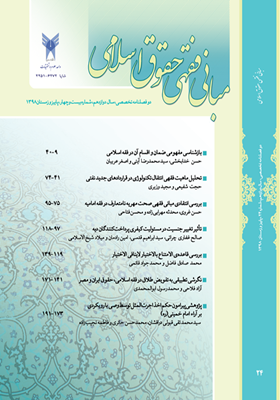بررسی قاعدهی الامتناع بالاختیار لاینافی الاختیار
محورهای موضوعی : جامع الفقهیه
محمدجواد قائمی
1
,
محمد صادق فاضل
2
*
,
رحمان ولی زاده
3
![]()
1 - استاد سطح عالی حوزه، حوزه علمیه قم، قم، ایران
2 - استاد سطح عالی حوزه، حوزه علمیه قم، قم، ایران
3 - عضو هیات علمی دانشگاه ازاد اسلامی، واحد بابل، مازندران، ایران
کلید واژه:
چکیده مقاله :
یکی از قواعد مسلم که بنحو کلی و فی الجمله مورد پذیرش همه اصولیون و فقهاء و حتی کلامیون در نفی جبر الهی در رفتار مکلفین مورد استناد قرار گرفته است، قاعده الامتناع بالاختیار لاینافی الاختیار است بر اساس این قاعده، اگر شخص از روی سوء اختیار خود را دوچار اضطرار به سمت فعل ممنوعه و یا ترک فعل مورد امر کند، این اضطرار سبب لغو عقاب و مسئولیت شرعی و کیفری آن نمیشود. مهمترین دلیل بر اثبات این قاعده در کنار دلالت ارشادی برخی آیات حکم عقل به صحت انعقاد و تجلی عنوان استحقاق عقاب متأثر از اختیار اولیه است. تنها اختلاف موجود در میان قائلین به این قاعده از جهت دائره شمولی آن نسبت به مقام تخاطب و اشتمال تکلیف با مقام تنجزیت عقاب است که بر اساس ادله اشتراط قدرت در تنجزیت عقاب، انحصار عدم تنافی درمقام تنجزیت صحیح به نظر میرسد. از حیث انطباق و کاربرد حقوقی میتوان گفت که کاربرد عمده آن در بخش قوانین مجازات اسلامی میباشد
One of the most definite rules, which is widely accepted by all the principles and jurisprudents, and even the clique in rejecting divine allegiances, is based on the rule of law, according to this rule, if a person is at his own discretion The urgent need for the prohibited verb or the termination of the verb, this urgency does not lead to the abolition of the Eagle and its religious and criminal responsibility. The most important reason for proving this rule, along with the guidance of the guidance of some verses, is the verdict of reason to the correctness of the coexistence and manifestation of the title of deserving the eagle affected by the original authority. The only disagreement among those who are involved in this rule is its inclusion in the position of the person and the duty of the Eagle, which, based on the evidence of the power in the Eagle's privilege, seems to be the monopoly of the lack of tolerance. In terms of adaptation and legal application, it can be said that its major application is in the Islamic Penal Code.

